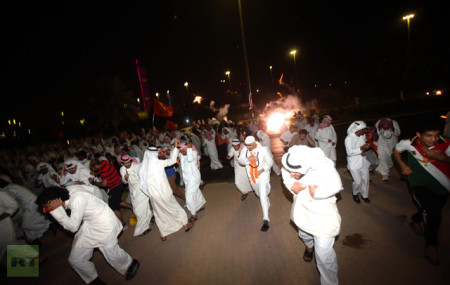PHOTO: Security forces disperse Kuwaiti protesters, October 2012
The New York Times highlights a tactic by Kuwait’s regime to quash political dissent: revoking citizenship.
State news agency KUNA says the monarchy has revoked the citizenship of more than two dozen people in the past three months, including 18 on Monday.
Human rights activist Sulaiman al-Jassem, who faces criminal charges for political views and attendance of protests, said, “They are sending a message. There are no limits [to the suppression].”
Another of those whose citizenship was revoked, Ahmed Jabr al-Shammari, ran a TV channel and newspapers who offered the views of opposition figures. The Government suspended the outlets and then shut them in July.
Kuwait has faced a series of protests in recent years. In 2011-2012, demonstrators briefly occupied the Parliament building and forced the removal of the Prime Minister.
The Kuwaiti regime is paralleled by others in the Gulf: in 2011, the UAE took passports from Islamist activists who had been naturalized citizens. Bahrain stripped 31 dissidents, including former MPs and exiled activists, of their citizenship in 2012.
In Kuwait, “statelessness” is not just an issue for dissidents. More than 100,000 Kuwaiti residents have been denied citizenship, despite being in the country for generations.
However, the regime’s recent steps have used the 1959 citizenship law to go farther by stripping passports from naturalized citizens who have committed crimes or obtained citizenship through fraud. Abdullah al-Barghash, a former opposition MP, was stripped of citizenship in July. Cleric Nabil al-Awady lost his in August, and opposition spokesman Saad al-Ajmi was among the group declared non-citizens on Monday.
And Ahmed Jabr al-Shammari’s case offers a new precedent. He is not naturalized but Kuwaiti-born, and he has been charged under a law that allows revocation of citizenship on the grounds of “undermining the economic or social system of the country”.

